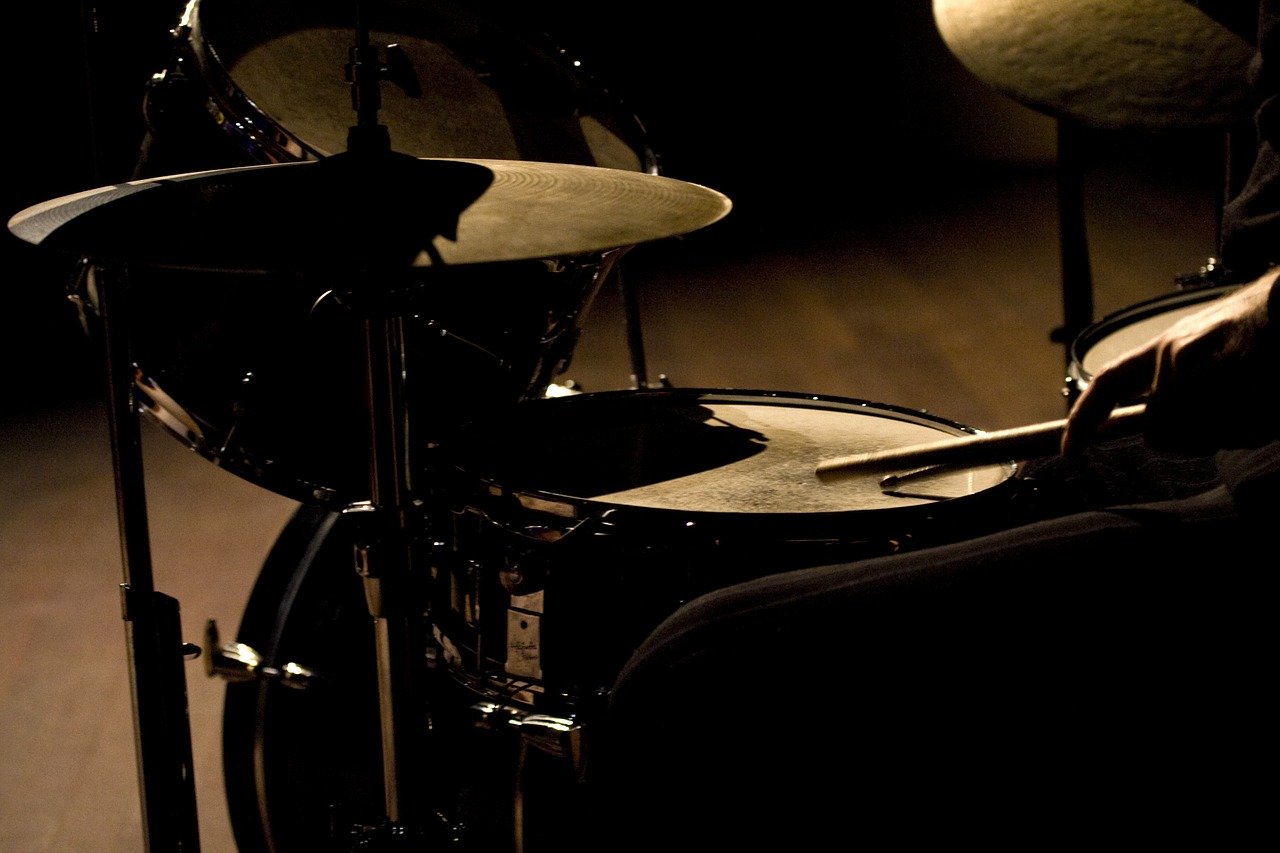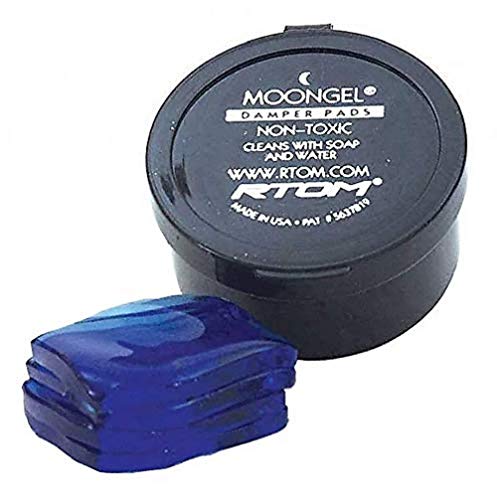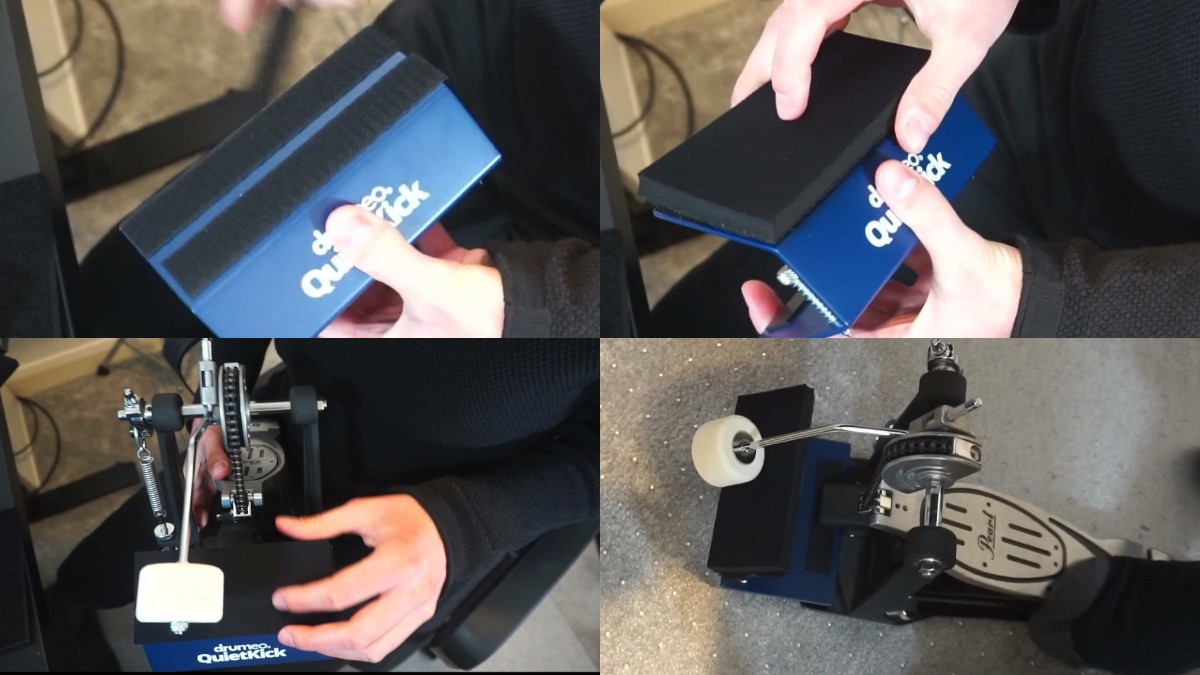10 Essential Drum Accessories for All Drummers (2024)

So you’ve already got a drum set, cymbals, hardware, drumsticks, and drum throne. As a next step, getting your hands on some of these essential accessories can take your skills and drumming experience to the next level.
These drumming accessories provide benefits ranging from:
- Improving your skills
- Helping your practice on the move
- Making it easier to set up and tune your drums
- Improving your drumming experience
- Protecting your hearing
Alternatively, if you are looking for gift ideas, then check out our mega list of the 50 best gifts for drummers.
Let’s get to it!
Contents
1. Practice Pad
I have lost count of the number of times on this site that we have stated the importance of practice pads for drummers.
They provide a practice outlet away from your drum set where you can really focus on your technique, rudiments, sticking, and timing. You can practice on the move, or even later at night if you have noise restrictions on the volume of your drum set.
All of these improvements are quickly transferable to your drum set.
If you don't already own one, then this should be one of the first essential accessories that you buy as a drummer.
If you're planning to travel a lot with it, then you should consider the 6" version of the Evans Realfeel practice pad, pictured above. Otherwise, the 12" version gives you more space to work with.
If you want to check out some different options, read our article about our recommendations for the best practice pads.
2. Speed Drum Key
I spent years using the same standard drum keys. It was quite a eureka moment when I finally realized that there are quite a few different types of drum keys available (We have a separate article about 7 different types of drum keys).
A standard drum key is quite a versatile tool, it's useful for changing and tuning, while also altering and adjusting hardware. However, its design does not make it particularly fast when it comes to drum heads.
If you often change or tweak your drum heads, then you should definitely consider getting a speed key. Even if you don't do it that often, it might get you out of a bind if you have to change a drum head quickly.
3. Drum Tuner
Most drummers perform pretty badly when it comes to tuning.
Adjusting one lug with your drum key might make one part of the drum sound great, but you quickly realize that each lug turn has a knock-on effect to the sound of the rest of the drum.
Drum tuning ends up being like a kind of plate spinning game where you're trying to keep them all up at once. And it's very easy to lose context and have it sounding terrible.
A drum tuner is not an essential accessory if you are great at tuning. For all other drummers, it's very useful to help get you in the right direction.
The Drumdial works by measuring the pressure of the drum head. You can note the pressure reading so that you can quickly tune to your preferred pitch in future. This is pretty handy when tuning before gigs or recording sessions.
I recommend the Drumdial. However, there are other tuners available, read our article on drum tuners for more information.
4. Drummer's Towel
Some drummers sweat a little while behind the kit, others sweat an awful lot (I'm thinking of the drummer from the band 'Battles' as an example here!)
This can be made much worse when you're on a stage with hot lights flashing at you, or when your drum kit is set up in a small corner at a bar.
A towel is great for comfort, but it's also good to use on your hands and sticks so you can keep your grip.
You could use just about any towel, but drummers love to get stuff with drum brand names on them, and what's one of the best brands in drumming: Zildjian. Enough said!
5. Drum Stick Holder
Drumstick holders are great for attaching to hardware such as a hi-hat stand. You can keep a few different set of sticks there for easy reach.
A drumstick holder is great when (A) you dropped a drumstick because your hands are sweaty and you forgot your Zildjian drummers towel (see accessory 4!) or (B) you want a few different types of drumsticks to use throughout your set, such as different sizes or stick types.
The On-Stage drum stick holder, pictured above, is a very popular option. It can hold a few pairs of drumsticks, and has a nice clamp that can attach to most stands.
6. Musicians Ear plugs
We recommend that all drummers keep a pair of musicians earplugs in their pocket for when they face loud environments. When behind the drum set, I would recommend going one step further and using noise-isolating over-ear protection or custom molded ear protection (note that I said noise-isolating, and not noise-canceling, as the latter won't do a lot to protect your hearing from very loud noises).
To state a very obvious fact, drums can be exceptionally loud instruments. The sound of a drum set can reach the pain threshold of hearing at pretty regular playing, which is beyond dangerous for long-term hearing health.
Your ears can only take a certain amount of noise before serious damage sets in. At 100 dB, the maximum recommended exposure time per 24 Hours is only 15 MINUTES! Drums and cymbals can be way louder than this. This is bad news for drummer in the area of chronic ringing (tinnitus) and hearing loss.
As a drummer, even if you are protecting your hearing while behind the drum set, you need to take extra care to protect your hearing throughout all the rest of your day, such as using machinery, when in traffic, going to concerts or clubs, and even listening to music on earbuds (which can be louder in decibels than rock concerts!).
You should stay conscious of protecting your hearing, and reaching for a set of earplugs like this whenever you feel that the noise around you is getting to dangerous levels.
7. Metronome
Novice drummers often assume their timing is perfect until they try to play to a metronome! Then they quickly realise how much they need to improve.
Playing to a metronome may not sound like the most exciting thing to do in the world, but it's one of the most important things that you can do as a drummer.
You should play to a metronome when you are practicing, and in many cases, when you are performing live. Many modern styles of music play to backing tracks of synced electronic instruments.
Also, music recording is almost always done using metronomes and click-tracks. Playing to a click should not be an afterthought. You should make it so that the click is part of your musical pulse while you are drumming. Only then can you play with full fluidity when you need to play to a drum metronome.
8. Drummers Headphones OR In-Ear Monitors
Great drummer headphones like the Vic Firth SiH2's, pictured above, reduce overall noise by around 25 dB. You are still going to be able to hear and feel your drumming, but it will be at a much more healthy volume.
As these headphones isolate you from external sounds, you can then listen to your metronome or backing tracks at a much safer volume. This is absolutely vital for your hearing health.
Alternatively to headphones, you can also consider getting in-ear monitors for drummers. You can pick up universal-fitting monitors at a pretty low price.
If you have the budget, I always recommend that you get custom in-ear monitors, but they are expensive.
9. Moongel Resonance Pads
Moongels are very commonly used to improve the sound of drum heads. Perhaps your snare has too much ring to it, or your toms are not punchy enough. Maybe one of your rack toms is tuned to just that pitch that makes your snare wires rattle in sympathetic resonance like crazy every time you hit them.
Some drummers use them to get that punchy sound, others use it to try to cover up bad drum tuning (not a great reason, but they can kind of do the job).
Whatever the reason, moongels are fantastic to dampen the sound of your drum heads whenever you want to. They are very cheap and last a long time, so there's not much to lose by getting a little pack of these.
10. Double Bass Drum Pedal
Ok, it's not an essential item for every drummer. They are most commonly associated with metal genres, but double kick pedals are very versatile for many different styles of music.
You can use them to come up with many different interesting and complex rhythms.
You should always try to drum with taste, i.e. drum to suit the music, and not treating every song like it's your personal opportunity for a drum solo. However, it's VERY fun to have a double bass drum pedal for practice time, and if it suits your genre, it might just be an essential accessory for your drum set.
The TAMA HP200PTW Iron Cobra 200, pictured above, is a great double bass drum pedal. It's from a top brand and it's pretty affordable in comparison to the high-end double kick pedals.
Summary
So there it is, the 10 essential drum accessories that all drummers should consider. All of the accessories mentioning in this article are extremely useful for drummers, and can certainly make life a lot easier as a drummer!
Most of the accessories mentioned above would be suitable for all types of drummers, with the exception of the double bass drum pedal, which is only applicable to certain styles.
Do you have any other accessories in mind that you would suggest adding to the list? Write a comment below!

















